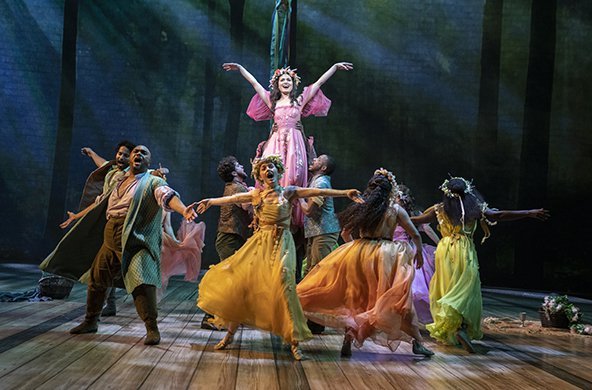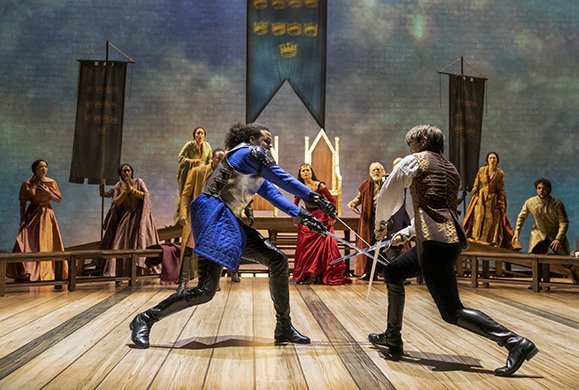Camelot
Phillipa Soo and the ensemble of Camelot.
Photo by Joan Marcus.
One would think while sitting in the front row at the Vivian Beaumont Theater, listening to their 30-piece orchestra, nothing would distract from the action taking place onstage. But while attending a performance of Lincoln Center Theater’s revival of Camelot, I was indeed distracted: the person sitting next to me was quietly singing along to the songs and commenting on the differences between the new, revised musical and the show that she knows and loves.
Indeed, many changes have been made to Camelot, not all for the good. Alan Jay Lerner and Frederick Loewe’s musical, inspired by T. H. White’s novel The Once and Future King, has achieved a lovingly nostalgic place in history, due to the score’s lush melodies and its conflation with the Kennedy dynasty. It’s easy to mythologize art through the softened lens of memory and forget its flaws.
But the flaws are there, and this attempt to erase them was not successful. In an attempt to revisit and modernize Camelot, director Bartlett Sherr brought on Aaron Sorkin, of West Wing and The Social Network fame, to rewrite the musical’s book. The goal, according to interviews, was to eliminate the mystical elements of the show and streamline its troublesome book. He is successful in his eliminations, but little is added in exchange. The result is a coolly impersonal political tale, with an implausible romance thrown in for good measure.
Arthur, played with boyish naivete by Andrew Burnap, is molded into one of Sorkin’s Great Men, striving to lead Camelot to an elevated place of moral and political purity. In Sorkin’s script, he is joined in these efforts by Guinevere, who is beautifully brought to life by Philippa Soo despite the muddled characterization in Sorkin’s script. The two’s extended meet-cute on their wedding day (arranged for diplomatic reasons) establishes the tone for the two’s dynamic. Attempting to convince Guinevere to honor the marriage rather than flee the arrangement, Arthur paints a rosy portrait of Camelot, to which Guinevere responds with skepticism. He praises the weather, she questions him, he explains it’s a metaphor and she informs him she knows what a metaphor is. When Arthur recounts his removal of Excalibur from the stone at age 15, Guinevere suggests the sword had been loosened after hundreds of previous tries. Rather than awed by Arthur’s destined royalty, she credits his crowning to physics and luck.
An attempt at equality is established between the two; Guinevere is shown easily defeating Arthur at chess while offering political guidance (reminiscent of The King and I, another Sher-helmed revival) and Arthur, in turn, refers to her as his “business partner,” to her apparent pain. Her reaction is one of the many contradictions cobbled together in an attempt to build a character. She warbles innocently of “The Simple Joys of Maidenhood” and later celebrates marital infidelity in “The Lusty Month of May” and shrewdly utilizes her feminine wiles to manipulate men in “Then You May Take Me to the Fair.” Soo is a thoughtful and vibrant performer, and her bell-clear soprano fills each corner of the theater, but the songs feel disconnected, like checkmarks on a list Sorkin was working through rather than elements of a complicated and fascinating woman.
This weak characterization only cheapens the romance between Guinevere and Lancelot, which, in the original production, serves to destroy the kingdom Arthur had so carefully built. But there is no heat, no passion, nothing in this relationship to justify such destruction. Played by Jordan Donica, Lancelot is deeply cerebral, profoundly religious and, despite Donica’s richly romantic voice, not at all exciting. He and Guinevere antagonize each other at first, battling in wits, but their falling in love is barely articulated or acted upon. Donica’s performance of “If Ever I Would Leave You,” a sweeping declaration of eternal love, is indeed swoon-worthy, but it feels unearned, as the tenderness and passion he sings of have never been witnessed. The second-act solo, “I Loved You Once in Silence,” originally sung by Guinevere, is now sung by Lancelot, leaving Guinevere’s feelings for him frustratingly unclear.
With the romance of Camelot lukewarm at best, the focus shifts to politics, the primary conflict arising from the rebellious knights, (Anthony Michael Lopez, Fergie Philippe and Danny Wolohan), spurred by Arthur’s illegitimate son, Mordred (Taylor Tensch) and declaring through song, “Fie on Goodness.” It’s easy to view them as the enemy when they sing of the good old days of sexual entitlement: “And when wooin’ called in Scotland / we’d grab any passing maid!”
The uneasy co-existence of Sorkin’s clumsy attempts to integrate egalitarianism into a musical originally written in the ‘60s and set long before, shatter the willing suspension of disbelief required to truly lose oneself in a musical. Guinevere is presented as an equal, but when her affair with Lancelot is learned, her subjects declare her “sentenced to the flame.” Morgan LeFay, originally a sorceress, now a woman in STEM and the unstable mother of Mordred, conceived by herself and Arthur when he was just 15 years old (an uncomfortable fact that is never addressed).
Instead, the true romance is intended as between Guinevere and Arthur, which is not articulated until the final scene, in an uncomfortable exchange that resonates as a last-minute addition to the script. Throughout the previous two hours and 40 minutes, I caught no glimpses of unspoken love or longing between the two; in fact, there were moments when I wondered if Guinevere and Arthur two had ever consummated their marriage.
This impersonal is further exemplified in the show’s visuals; one would think a royal legend would inspire a regal setting. Instead, Michael Yeargan’s set designs are surprisingly sparse. Lap Chi Chu’s lightning and projections by 59 Productions offer some enhancement, as do Jennifer Moeller’s costumes, but the creatives of the show feel like lost opportunities.
A Lincoln Center revival of Camelot sounds like a musical theater slam dunk - a classic story, a beloved score, a cast of 27 and an orchestra of 30, an onstage swordfight (staged by B.H. Barry), and a director known for breathing exciting new life into classic musicals. But, just like the magic was removed from the story, the magic of this show – if it ever really was there – is gone as well. The reality is pleasant, but one dreams of more.


